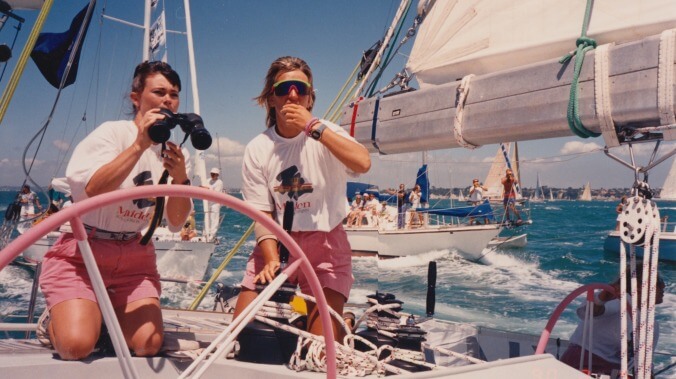Tracy Edwards was a teenage runaway–turned-cook on an ocean vessel when she first heard about what was then called the Whitbread Round The World Race, now aptly named the Ocean Race. She knew, down to her bones, that she absolutely had to be on one of those ships. But she was a woman, and the men of the late-’80s yachting world made it abundantly clear to her that a boat setting out to circumnavigate the planet was absolutely no place for a lady. So she charted her own course, both literally and metaphorically. That’s the thrust of Maiden, a no-frills documentary about Edwards’ sailing adventure, as told by the skipper herself and her crew. Director Alex Holmes and editor Katie Bryer cannily draw out the story beneath the story, allowing it to bob along in the wake of Edwards’ tale. It’s an underdog yarn that’s also about how a bold act can move the world forward, whether the world likes it or not.
Maiden, also the name of the secondhand yacht Edwards acquired after taking out a second mortgage on her home, tells its story through multiple sources. This includes, most indispensably, direct-to-camera interviews with Edwards, childhood friend and future crew member Jo Gooding, the rest of the Maiden’s crew, competitors on other yachts, and members of the yachting press who covered the race and Maiden, often uncharitably. Holmes and Bryer mix these talking-head recollections with found and archival footage, some of it taken from aboard Edwards’ yacht, some culled from press reports. This straightforward approach to an undeniably inspirational story steers Maiden clear of cheap manipulation. Those moved by the film will be moved by the women telling it.
But Holmes is doing a little more than just letting his interview subjects present the tale. He teases out societal and political undercurrents, subtly enough to allow the audience to arrive at its own conclusions. During one unearthed interview with the young skipper, Edwards—whose quest was novel enough to generate a lot of media coverage, though her youth and beauty didn’t hurt either—breezily rejects the label of feminist. She’s irritated, perhaps a little defensive. She loves men, she says; she just wants to prove that women can do this, too. Maiden moves on, not returning to the point until much later, but along the way we hear the crew described as “tarts in a tin,” and see the frustration—lingering decades later—with the way even their successes were covered. We watch Edwards and her team experience casual misogyny, open hostility, and blatant disrespect from their peers and the press. And we watch them occasionally play that to their advantage, as when a stumble in one leg of the race puts Maiden in a bad position, and the crew opts to wear their swimsuits as they approach the shore, in hopes that the spectacle will distract the press from asking questions about what went wrong.
Never does Maiden feel the need to hit its points over the head; it simply allows the audience to share Edwards’ experience, perhaps in the process coming along on her voyage of personal awakening. It’s an approach that distinguishes the movie from the average inspirational sports drama, even as its scrappy true story of underdog perseverance absolutely fits that bill—and benefits, greatly, from the likelihood that your average viewer will not, off the top of their head, know the results of the 1989–90 Whitbred race. None of Holmes’ subtler choices would work if Edwards’ quest were not such an engrossing one, and if the interviews weren’t so lively. The women of Maiden re-create the voyage with their words. Sharing their heartache, their determination, and their merciful humor, they strongly suggest that those days at sea live on in the minds of those who weathered them. The footage may be grainy, the sails long since retired, but through the candor of his subjects, Holmes has made a film in which the past is very much present.

